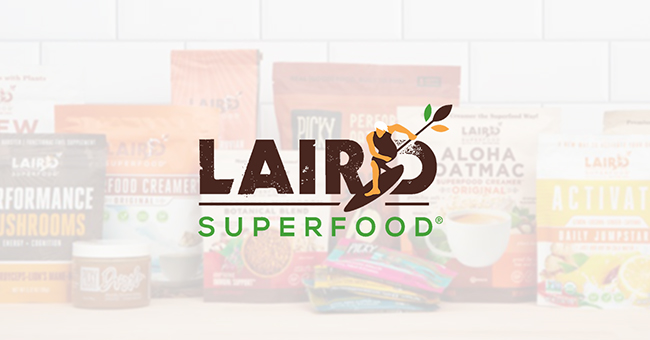
Despite strong online and in-store numbers that helped push a 26% increase in year-over-year net sales to $9.6 million, Laird Superfood reported a net loss of over $14 million during Q1 2022, according to an earnings report released by the company on Friday.
The Sisters, Oregon-based brand, co-founded by famed big wave surfer Laird Hamilton in 2015, markets a range of function-forward plant-based products, including creamers, coffees, drink mixes and snacks, among other items. One month after landing $10 million in funding from Danone Manifesto Ventures in August 2020, the digital-native company went public.
During the first quarter of this year, online sales, which includes Amazon, represented 58% of net sales, a 24% increase from the same period in 2021. Direct-to-consumer sales from Laird’s website were up 35%. Driven by expansion of its liquid and powdered creamers, net sales in the wholesale channel increased 31% year-over-year, contributing 41% of net sales.
In a press release, Jason Vieth, who joined Laird as president and CEO earlier this year, said actions the company has taken in Q1 to “strengthen operations and sharpen our strategic focus” should yield tangible improvements in Q2. He also credited “several key customer wins” in the past month as reflective of “the immediate impact of recent additions to our leadership team.”
“While the overall macro environment remains challenging, the power of our brand and omnichannel platform continue to provide multiple pathways to growth and improved profitability,” said Vieth.
Gross profit was up slightly to $1.9 million from $1.8 million the prior year, while gross margin was 20.9% compared to 24.8%. As of March 31, the company had $27.3 million in cash and cash equivalents. The company cited “elevated promotional activity, elevated inventory costs and general inflationary pressures” as the source of gross margin declines, which were partially offset by “continued optimization of DTC parcel cost” and “spoils and waste reductions associated with our refrigerated liquid creamer.”
Like other CPG brands, Laird has seen its costs climb over the last 12 months; operating expenses were $15.9 million in Q1 2022, compared to $7.2 million in 2021. According to a release, $8 million of that is attributable to a non-cash charge for goodwill and intangible asset impairment recorded under General and Administrative expense.
However, net loss was $14.1 million during the quarter, up from $5.3 million the same period in 2021. Adjusted net loss was $6.7 million, compared to $5.3 million.
“We’ve made significant progress optimizing our cost structure and will be implementing several margin enhancing initiatives over the balance of 2022 that we expect to help drive greater consistency and accelerate our path to profitability,” said Valerie Ells, CFO at Laird, in the release. “These efforts include, but are not limited to, pricing initiatives, SKU rationalization, organizational structure changes, and marketing spend refinement. We are pleased with the progress made in cash usage in the current period and will continue to focus on efficiency and leverage.”
The company has also reduced headcount during the quarter, citing “a combination of the automation and the process improvements.” Reformulation is also on the cards for some of Laird’s existing products, Vieth added, as the company looks to drop expensive “superfluous” ingredients that consumers aren’t recognizing. Other cost-cutting measures include consolidation of its off-site pallet positions.
The company is maintaining its guidance for the full year 2022, projecting net sales to increase 15% from the midpoint over 2021, coming in the range of $41 million to $44 million. Gross margin is estimated to be in the range of 24% to 26%, versus 25.6% in 2021.
Andy Judd, Laird’s newly hired CCO, also shared some innovation news during the call: this summer, the company is set to launch branded snack bars featuring 10 grams of plant-based protein made from a blend of pea, hemp and pumpkin seeds. The product represents an opportunity for Laird to expand incrementally into an afternoon snacking use occasion that is complementary to its existing SKUs under the Picky Bars brand, which it acquired in a $12 million transaction in 2021.
Judd said Laird’s new higher-protein, lower-carb bars gives the brand “a chance to leverage some of the capabilities we’ve been able to build” via Picky Bars and drive incrementally across both. Launching Laird’s first branded bars while continuing to expand the Picky Bars business will be a “really big strategic shift” for the company, Vieth admitted.
“That gives us the ability to sell (Laird) and Picky Bars as a complete package of very differentiated brands and products, with the Picky Bar being more of that immediate energy source available for on-the-go and athletic consumption, whereas Laird’s protein bar is not bringing those carbs in the same way. And so we’re really excited about what those two can do together for us.”